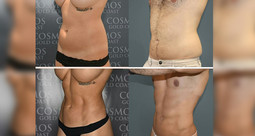Liposuction is one of the most widely performed cosmetic procedures globally, but its purpose is often misunderstood. It is essential to recognise that liposuction is not a weight-loss treatment but a targeted approach to address areas of excess fat that are resistant to diet and exercise.
How Much Weight Can I Lose with Liposuction?
The primary goal of liposuction is to remove fat cells from specific areas of the body, such as the abdomen, thighs, or arms. However, the amount of fat removed is not significant enough to create a drastic change in overall body weight.
Typically, the amount of fat removed during liposuction ranges between 2-2.5 kgs. In some cases, up to 5kg may be removed, but larger amounts increase the risks of the procedure. For patients requiring removal of greater volumes, the process is often split into multiple sessions spaced at least one month apart.
Liposuction is most effective for individuals close to their target body weight who are looking to address localised fat deposits resistant to diet and exercise. It is not recommended as a solution for general weight loss or for individuals with significant excess weight.
What Happens If I Gain Weight After Liposuction?
Liposuction permanently removes fat cells from the treated areas, meaning these specific cells cannot regenerate. However, remaining fat cells in the body can still expand with significant weight gain, and untreated areas may accumulate more fat.
For example:
- If your body weight remains stable after surgery, the results of the procedure will likely be preserved.
- With minor weight fluctuations (2-3 kg), fat redistribution will be minimal, and results should still be noticeable.
- Significant weight gain (10 kg or more) can lead to fat accumulation in untreated areas, which may alter your overall appearance.
It’s important to maintain a stable, healthy lifestyle post-surgery.
Minimising Weight Gain and Maintaining Results
After liposuction, swelling and fluid retention may temporarily increase your weight. Most of this resolves within 4-6 weeks as your body heals. To maintain your results:
- Wear compression garments: These garments are crucial for supporting recovery, reducing swelling, and aiding fluid drainage. They should be worn as directed by your doctor for optimal recovery. Learn more about aftercare guidelines here.
- Follow a healthy diet: Focus on balanced meals with carbohydrates, proteins, fruits, and vegetables. Avoid excessive sodium, as it can contribute to fluid retention.
- Incorporate light exercise: Begin with light activities, such as walking, as soon as it is safe. Avoid intense or heavy exercise for at least six weeks post-surgery.
Maintaining a consistent weight and avoiding drastic fluctuations through diet or lifestyle changes is essential for long-term results.
What About Skin After Liposuction?
Liposuction does not directly address skin quality. Individuals with reduced skin elasticity may experience some excess skin after fat removal. Combining Vaser Liposuction with skin-tightening techniques, such as Renuvion technology, may help address these concerns by stimulating collagen production and improving skin firmness.
Is Liposuction Right for You?
The best candidates for liposuction are those who maintain a healthy lifestyle and have specific areas of fat that are resistant to exercise and diet. If you’re considering liposuction, a consultation with a qualified practitioner can help determine if the procedure is suitable for you.
To learn more about Vaser Liposuction, you can enquire with Cosmos Clinic on 1300 138 797.






